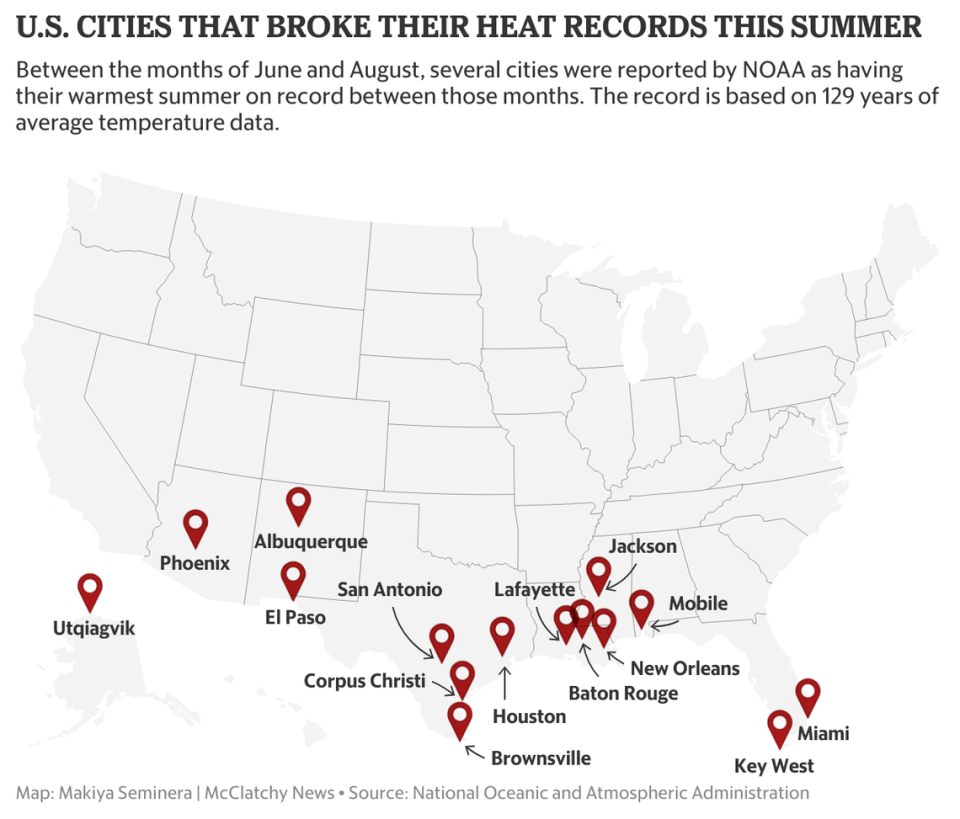No, you didn’t imagine it — it was hottest summer yet. See which cities broke records
If this summer felt hotter than usual, you weren’t alone.
The summer of 2023 has been the hottest summer ever since scientists began keeping global temperature records in 1880, according to a Sept. 14 NASA news release. As a result of the soaring temperatures, several countries around the world have experienced worsening natural disasters throughout the summer, officials said.
Record-breaking heat hasn’t exactly been a unique feat over the past decade. Between 2015 and 2021, the earth’s global temperature continued to track as the warmest ever each year, according to a 2021 news release from Copernicus, part of the European Union’s space program.
Prominent scientific institutions around the globe including the National Oceanic and Atmospheric Administration agree that the warming is caused mainly by “human-caused greenhouse gas emissions,” NASA said.
But now with summer officially ending Saturday, Sept. 23 — although it might not feel like it in certain places — we can take a look at which U.S. cities and states broke their own heat records between June and August. If a city or state had its hottest summer ever, that was based off 129 years of data collected by NOAA.
(September heat data has not yet been made available on NOAA’s Climate at a Glance mapping website.)
Which cities, states broke records
Fifteen cities clocked in their warmest summer between June and August, according to NOAA data. Racking up the most new highs were Texas, which saw five cities with record-breaking heat, and Louisiana, which had three cities break records.
Other states that had cities that broke heat records in 2023 included Alaska, Arizona, Florida, Mississippi and New Mexico.

Several other cities across the country reported summers that ranked in their top five hottest summers from the last 129 years. Those cities are listed below:
Tucson, Arizona: No. 2 hottest summer
Jacksonville, Florida: No. 2 hottest summer
Tampa, Florida: No. 2 hottest summer
Monroe, Louisiana: No. 2 hottest summer
Shreveport, Louisiana: No. 2 hottest summer
Roswell, New Mexico: No. 2 hottest summer
Austin, Texas: No. 2 hottest summer
Dallas, Texas: No. 2 hottest summer
Del Rio, Texas: No. 2 hottest summer
Lubbock, Texas: No. 2 hottest summer
Midland, Texas: No. 2 hottest summer
Waco, Texas: No. 2 hottest summer
Fairbanks, Alaska: No. 3 hottest summer
Sitka, Alaska: No. 3 hottest summer
Daytona Beach, Florida: No. 3 hottest summer
Fort Myers, Florida: No. 3 hottest summer
Orlando, Florida: No. 3 hottest summer
Lewiston, Idaho: No. 3 hottest summer
Kalispell, Montana: No. 3 hottest summer
Fargo, North Dakota: No. 3 hottest summer
Abilene, Texas: No. 3 hottest summer
Juneau, Alaska: No. 4 hottest summer
Tallahassee, Florida: No. 4 hottest summer
St. Paul, Minnesota: No. 4 hottest summer
Spokane, Washington: No. 4 hottest summer
Multiple states overall also had one of their top 10 hottest summers on records, but Louisiana was the only state that reported its hottest summer. Texas and Florida followed close behind with summer 2023 being their second hottest summer on record.
Tracking temperature anomalies are a common way for scientific organizations to evaluate how hot the Earth is getting. Anomalies were the main way the NASA calculated the summer of 2023 as the hottest summer on record, the Sept. 14 release says, which compares temperatures to the “1951 to 1980 base average.”
States throughout the Southeast and the West recorded temperature anomalies above what the heat base average is. A majority of states in the Northeast also tracked higher temperature anomalies.
What NASA, NOAA says about global summer heat
Globally, temperatures were about a half-degree hotter this summer than any other in NASA’s records. Specifically when comparing this summer to the average summer temperatures between 1951 and 1980, summer 2023 was around 2 degrees warmer.
“Summer 2023’s record-setting temperatures aren’t just a set of numbers – they result in dire real-world consequences. From sweltering temperatures in Arizona and across the country, to wildfires across Canada, and extreme flooding in Europe and Asia, extreme weather is threatening lives and livelihoods around the world,” NASA administrator Bill Nelson said in the release. “The impacts of climate change are a threat to our planet and future generations, threats that NASA and the Biden-Harris Administration are tackling head on.”
El Niño, a climate pattern that cyclically warms the eastern Pacific waters, may also have contributed to the hotter-than-average temperature felt this summer.
The global impacts of rising heat levels were listed at length in the release — ranging from devastating wildfires in Canada and Hawaii to torrential rainfall in several European countries.
NOAA also released a list of “significant climate anomalies and events” for August 2023, which spanned across the globe. Some of those climate events on NOAA’s list are:
Arctic “sea ice extent” was the eighth lowest on record.
Antarctic “sea ice extent” was its lowest ever on record.
Europe had its third-warmest summer.
“Prolonged monsoon rains” caused severe flooding in Pakistan and India. Similar floods occurred in Bangladesh.
Hurricane Idalia’s landfall in Florida’s Big Bend was “strongest hurricane to hit the region in more than 125 years.”
Rising sea temperatures have also shot up since the 1990s, with 2022 having the warmest ocean temperature yet, according to NASA’s ocean warming data. 2023 is on track to pass that record.
It’s so hot in Texas, an armadillo was spotted swimming along the coast, video shows
Iconic swimming hole is drying up in Texas. ‘Maybe our tears will fill the well’
Thousands of dead fish wash up along Texas coast, disturbing photos show. Here’s why

